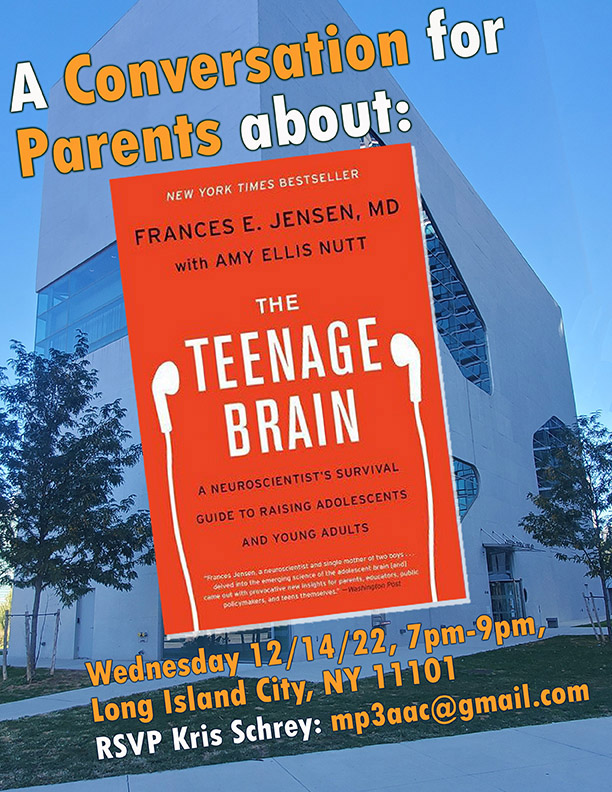12/14/22 Beacon Parent Book Club & Meet-up

The book The Teenage Brain has opened up a whole new level of understanding of teens. Beacon parent Kris Schrey is hosting a conversation inspired by the book at his home in Long Island City — just 7 minutes on the 7 train from Grand Central (exit at Vernon Boulevard, first stop on the Queens side). The focus of the conversation will be personal experiences and struggles (not a critical review of the book). Sushi, finger food, and non-alcoholic refreshments will be provided. Please RSVP to mp3aac@gmail.com if you are interested in attending.
What: A conversation based on Dr. Frances E. Jensen‘s book, The Teenage Brain: A Neuroscientist’s Survival Guide to Raising Adolescents and Young Adults– see more about the author and book below (click here for NPR’s interview with Dr. Jensen).
Date: Wednesday, December 14th, 2022
Time: 7pm-9pm
Where: 5-09 48th Avenue, Apt #3A, Long Island City, NY 11101
Who: Parents/Guardians only
FYI: Sushi, finger food and non-alcoholic refreshments will be provided.
Frances E. Jensen — The Teenage Brain: A Neuroscientist’s Survival Guide to Raising Adolescents and Young Adults
Dr. Frances E. Jensen is chair of the department of neurology in the Perelman School of Medicine at the University of Pennsylvania. In The Teenage Brain, Dr. Jensen brings to readers the astonishing findings that previously remained buried in academic journals.
Teens are better learners than adults because their brain cells more readily “build” memories. But this heightened adaptability can be hijacked by addiction, and the adolescent brain can become addicted more strongly and for a longer duration than the adult brain.
- Studies show that girls’ brains are a full two years more mature than boys’ brains in the mid-teens, possibly explaining differences seen in the classroom and in social behavior.
- Adolescents may not be as resilient to the effects of drugs as we thought. Recent experimental and human studies show that the occasional use of marijuana, for instance, can cause lingering memory problems even days after smoking, and that long-term use of pot impacts later adulthood IQ.
- Multi-tasking causes divided attention and has been shown to reduce learning ability in the teenage brain. Multi-tasking also has some addictive qualities, which may result in habitual short attention in teenagers.
- Emotionally stressful situations may impact the adolescent more than it would affect the adult: stress can have permanent effects on mental health and can to lead to higher risk of developing neuropsychiatric disorders such as depression.